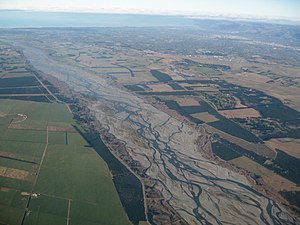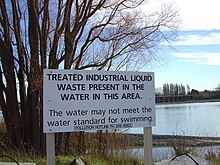Waimakariri River
| Waimakariri River | |
|---|---|
 The Waimakariri with Christchurch in the background | |
| Location | |
| Country | New Zealand |
| Physical characteristics | |
| Source | |
| - location | Southern Alps |
| Mouth | |
| - location | Pacific Ocean |
| - elevation | 0 m (0 ft) |

The Waimakariri River has its source in the Southern Alps and flows across the Canterbury Plains of the South Island of New Zealand

View of the Waimakariri River looking towards the Southern Alps
The Waimakariri River, formerly briefly known as the Courtenay River, is one of the largest of the North Canterbury rivers, in the South Island of New Zealand. It flows for 151 kilometres (94 mi) in a generally southeastward direction from the Southern Alps across the Canterbury Plains to the Pacific Ocean. In Māori, Waimakariri has several meanings, one of which is "river of cold rushing water". The river is known colloquially in Canterbury as "The Waimak".[1]
The river rises on the eastern flanks of the Southern Alps, eight kilometres southwest of Arthur's Pass. For much of its upper reaches, the river is braided, with wide shingle beds. As the river approaches the Canterbury Plains, it passes through a belt of mountains, and is forced into a narrow canyon (the Waimakariri Gorge), before reverting to its braided form for its passage across the plains. It finally enters the Pacific north of Christchurch, near the town of Kaiapoi.
In 1849, the chief surveyor of the Canterbury Association, Joseph Thomas, gave the river the name Courtenay River after Lord Courtenay, but it lapsed into disuse.[2][3]
Geological evidence indicates that the river mouth has been very mobile, at times flowing through the current location of Christchurch and even flowing into Lake Ellesmere / Te Waihora south of Banks Peninsula for a time.[4]
Instead of being unoccupied crown land as are most New Zealand river beds, the bed of the Waimakariri River is vested in the Canterbury Regional Council (Environment Canterbury).[5]
Chinook salmon (Oncorhynchus tshawytscha) were introduced from California in the 1900s and persist today.[6]
Contents
1 Development
2 Pollution
3 References
4 External links
Development
In 1923 the river was mainly investigated for a hydroelectric dam to supply electricity to Christchurch. It received support from the community but the dam was never built since the Government offered inexpensive electricity from the Lake Coleridge scheme.[7]
The Central Plains Water Trust is proposing to take 40 cubic metres per second (1,400 cu ft/s) of water from two points on the Waimakariri River as part of the Central Plains Water enhancement scheme.[8]

A water pollution sign on the lower reaches of the river
Pollution
In 2007 the Waimakariri was ranked as one of the ten most polluted of the larger rivers in New Zealand.[9] Some of the pollution was caused by liquid wastes from industries such as a meat processing plant and wool scourers in the vicinity of the river. The wastes were discharged directly into it but as of 2012 it was piped to the municipal sewage treatment plant. There had been some non-compliance issues with the resource consents for water discharge.[10]
References
^ Logan, Robert (1987). Waimakariri. The story of Canterbury's "river of cold rushing water". Christchurch: Robert Logan. ISBN 0-473-00520-4..mw-parser-output cite.citation{font-style:inherit}.mw-parser-output q{quotes:"""""""'""'"}.mw-parser-output code.cs1-code{color:inherit;background:inherit;border:inherit;padding:inherit}.mw-parser-output .cs1-lock-free a{background:url("//upload.wikimedia.org/wikipedia/commons/thumb/6/65/Lock-green.svg/9px-Lock-green.svg.png")no-repeat;background-position:right .1em center}.mw-parser-output .cs1-lock-limited a,.mw-parser-output .cs1-lock-registration a{background:url("//upload.wikimedia.org/wikipedia/commons/thumb/d/d6/Lock-gray-alt-2.svg/9px-Lock-gray-alt-2.svg.png")no-repeat;background-position:right .1em center}.mw-parser-output .cs1-lock-subscription a{background:url("//upload.wikimedia.org/wikipedia/commons/thumb/a/aa/Lock-red-alt-2.svg/9px-Lock-red-alt-2.svg.png")no-repeat;background-position:right .1em center}.mw-parser-output .cs1-subscription,.mw-parser-output .cs1-registration{color:#555}.mw-parser-output .cs1-subscription span,.mw-parser-output .cs1-registration span{border-bottom:1px dotted;cursor:help}.mw-parser-output .cs1-hidden-error{display:none;font-size:100%}.mw-parser-output .cs1-visible-error{font-size:100%}.mw-parser-output .cs1-subscription,.mw-parser-output .cs1-registration,.mw-parser-output .cs1-format{font-size:95%}.mw-parser-output .cs1-kern-left,.mw-parser-output .cs1-kern-wl-left{padding-left:0.2em}.mw-parser-output .cs1-kern-right,.mw-parser-output .cs1-kern-wl-right{padding-right:0.2em}
^ Blain, Rev. Michael (2007). The Canterbury Association (1848-1852): A Study of Its Members’ Connections (PDF). Christchurch: Project Canterbury. pp. 25–27. Retrieved 21 March 2013.
^ Hight, James; C. R. Straubel (1957). A History of Canterbury. Volume I : to 1854. Christchurch: Whitcombe and Tombs Ltd. p. 121.
^ Waimakariri River, An important asset to the region, Environment Canterbury website, retrieved 18 April 2008.
^ Waimakariri River Improvement Act 1922, Section 17(1) - Parliament of New Zealand.
^ McDowall, R. M. (1990) New Zealand freshwater fishes: a natural history and guide. Heinemann-Reed, Auckland, 553 p.
^ Crean, Mike (2008-04-26). "Waimak's elusive dam". The Press.
^ Central Plains Water Trust applications for resource consent Archived 15 March 2007 at the Wayback Machine. Environment Canterbury Resource Consents webpage, retrieved 6 October 2007.
^ "New Zealand's National River Water Quality Network - River water quality league tables". Ministry for the Environment. 20 October 2009. Retrieved 27 December 2012.
^ "Fish & Game Celebrates Waimakariri Water Quality". Fish & Game press release. Scoop. 21 December 2012. Retrieved 27 December 2012.
External links
| Wikimedia Commons has media related to Waimakariri River. |
Waimakariri River Regional Plan at Environment Canterbury
- The Waimakariri River as a water resource. Dalmer, 1971
Coordinates: 43°23′26″S 172°42′43″E / 43.3905°S 172.712°E / -43.3905; 172.712